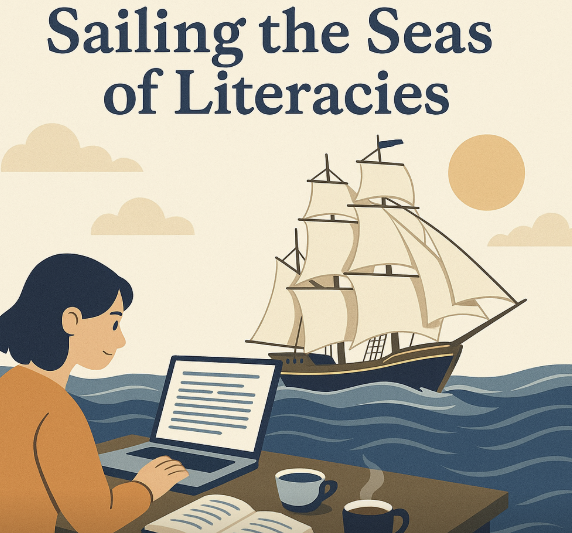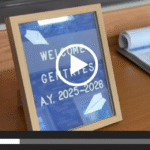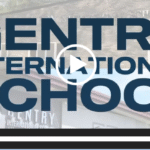Sailing the Seas of Literacies
Sailing the Seas of Literacies
With scattered notes textbooks and a cup of coffee within arm’s reach, I started reading my prerequisite material online. Upon completing “Turkle’s Triumph of Thinking”, I found myself momentarily lost in thought. While I lifted my gaze from the text, I started to think back about my journey of transmission of my literacy, and concepts in Turkle’s narrative connect my personal experience with comprehensive reading and writing. As for me, I do have a strong individual awareness of my digital habits and understand how they affect my personal well-being and interpersonal connections. Actually, at that moment, I could not even remember how I forgave traditional paper reading and writing and came to understand that my engagement with literacies extends far beyond the conventional realms of ink and paper. And, I realized that the concept of literacy extends far beyond the traditional boundaries of reading and writing in the digital world. In this essay, through introspection and exploration, I narrate stories and experiences that shaped my understanding of literacies and their significance in my life.
My literacy journey began at the kindergarten desk with picture books and short stories. The moment, listening to the talk of teachers, was my first step into the vast world of language. Folk tales and legends told by the old made me perceive the charm of language. As a little girl, I delighted in assembling stories, and weaving tales of adventure and fantasy. After entering junior high school, writing swiftly evolved into my preferred avenue for self-reflection and imaginative exploration. It served as my chosen medium for introspection and creativity, whether expressed through spontaneous jottings in a personal diary or structured essays crafted for educational purposes. However, it was the presence of a family computer that catalyzed my journey into digital literacy, representing a pivotal moment in the evolution of my literacy environment.
With the progression of technology, my range of literacies similarly expanded. I started to use social media, browsed a lot of websites, and communicated through emojis. Through browsing all the news and social media, I saw digital literacy as an essential bridge connecting individuals to vast opportunities. People could get in touch with someone else living far away, engaging in ways of interaction that surpass my wildest imagination. It also plays a critical role in equalizing opportunities, offering the potential to democratize access to information, education, and opportunities, and overcoming geographical, socio-economic, and cultural barriers. In that case, digital literacy enhances educational experiences by enhancing access to a wide range of learning materials and platforms online. It facilitates customized educational journeys and aids in closing learning disparities by offering online classes, instructional videos, and engaging educational resources. As far as I am concerned, digital literacy is a pretty useful tool for my study. When I decided to learn Chinese poems and culture in the Tang dynasty, I always found it hard to find out the meaning of each word and get an entire understanding of the strophe. I have to search for the interpretation of each word in the dictionary and then figure out the language environment. The process is time-consuming. However, the situation became quite different when I began to get help from technology. For example, e-books provide interactive annotations, audio readings, and visual elements, deepening my understanding of poetic themes and cultural nuances. They also offer personalized learning experiences through adjustable settings and embedded multimedia, making the exploration of Chinese literature both engaging and comprehensive. Meanwhile, radio broadcasts and podcasts present poetry readings and cultural discussions, allowing me to immerse myself in the sounds and rhythms of the Chinese language. These auditory experiences enrich language skills and bring to life the emotional depth of Chinese poetry, offering a dynamic complement to the visual and interactive benefits of e-books.
Oppositely, the digital landscape is in a state of constant flux, with new technologies, platforms, and challenges regularly occurring. To be specific, in the ever-expanding digital universe, the information is always confusing, mixing with facts and unknown events. In that case, it’s quite essential to enhance the ability to discern reliable information from unreliable information. The misleading nature of some information may cause misunderstandings of certain concepts, and finally lead to mistakes in our literacy writing. In addition, digital communication has reshaped human interaction. While it enables more frequent interaction across distances, this mode of communication always lacks the depth and emotional quality found in face-to-face exchange. The deficiency may hinder the formation and preservation of meaningful connections, as the emphasis shifts from the quality of interactions to the quantity of information. However, communication plays an important role in shaping one’s literacy system, and the low quality of communication limits literacy development, for example, the clarity in conveying complex concepts.
In conclusion, while navigating the balance between digital and real-world interaction could be a challenge in society, our journey through the evolving practices of reading and writing has highlighted the profound impact that these foundational skills have on personal and societal growth. As we steer towards the future, it is crucial to adjust and broaden our understanding of literacy to include the intricacies of the digital era with critical thinking and personal insights.
Feiyu Lin





